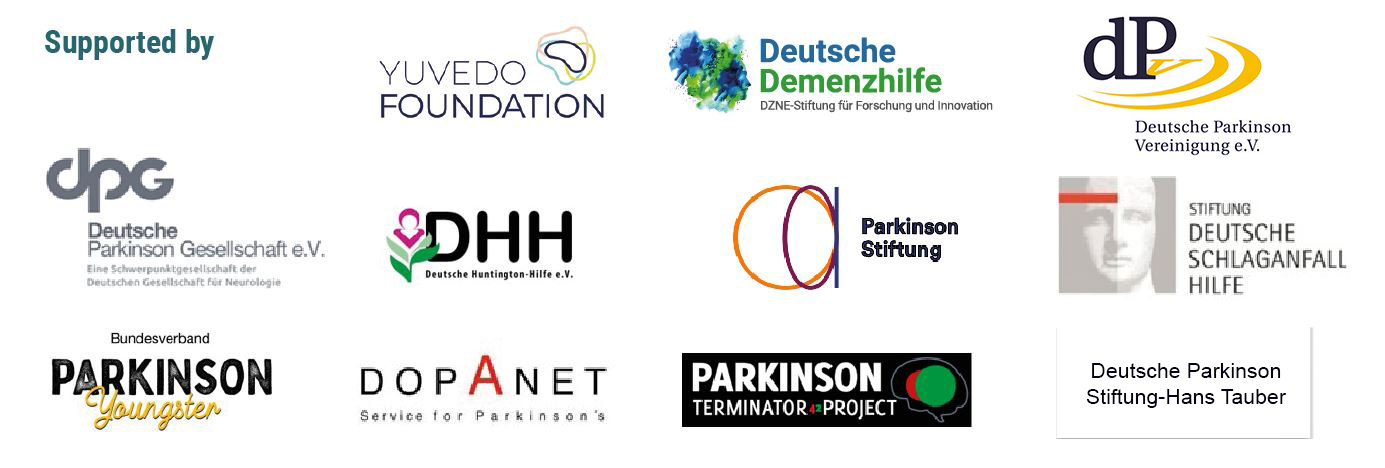NEURO INITIATIVE 4.0 – gemeinsam gegen Neurodegeneration
An initiative of the YUVEDO Foundation and the DZNE Patient Advisory Board
More and more people, including younger people, are suffering from neurodegenerative diseases - in Germany alone, more than 2 million people have dementia or Parkinson's disease. To date, there are no effective therapies for these diseases that slow down or stop the progression of neurodegenerative diseases.
The consequences of the diseases are severe for those affected and their relatives, both physically and psychosocially. This is also due to the social stigma that still exists. These diseases can last for decades.
The effects on society are immense in the medium and long term: the care of patients, especially in the advanced stages, interferes with the lives and activities of numerous other people. Our health and care system is currently not geared to the increasing number of people affected.
Our goal is to use strong patients, smart minds and the application of artificial intelligence to drive forward determined neuro and brain research in Europe and to create public awareness. This requires unconditional political support across parties.
Therefore, we demand from German and European politics:
1. Improve exercise offers
Alzheimer's, Parkinson's, ALS, Huntington's and other neurodegenerative diseases are not yet curable. Scientific evidence shows that activity and exercise, for example, can demonstrably delay or mitigate disease progression and are relatively easy to implement. We need more education and better incentives for health-promoting lifestyles by health insurers, health departments and society, and accompanying research to implement successful strategies in the population.
2. Prevent discrimination and stigmatization
Neurodegeneration is hidden: Alzheimer's patients often do not want to hear the diagnosis, their relatives fear the burden. Parkinson's patients withdraw from the public and their social environment because they are ashamed of the symptoms. Diseases such as ALS and Huntington's disease are virtually unreported in the media. But the diagnoses are there and the number of people affected and their relatives is growing. We have to talk about it, we have to educate, we have to take away the shame. Only then can we address the problems openly and promote care and self-help. This must be done with the active involvement of those affected (participation) in research and decision-making processes.
Good initiatives such as the German government's "Nationale Demenzstrategie" are still far too little visible and underfunded - we need a nationwide, public, binding and funded plan that empowers patients and relatives and educates them about the diseases and how to deal with them.
3. Preserve jobs, offer flexible working models
Neurological and neurodegenerative diseases affect many people who are still working. The lack of societal and professional awareness of the disease also often leads to discrimination in the workplace. We need more understanding in society of the needs of people with these diseases who are still able to participate in working life, as well as effective employer strategies for flexible workplaces that support people with Parkinson's disease or after a stroke in the workplace, for example.
4. Better prevention and treatment of secondary mental illnesses
The quality of life of patients with Parkinson's disease and other neurological disorders can be significantly impaired by non-motor accompanying symptoms. Drug-induced impulse control disorders such as impulsive shopping and eating, gambling addiction and hypersexuality are a great burden for patients and relatives and must finally be taken seriously. We call for more education on this taboo and the development of effective, preferably preventive treatment strategies.
5. Improve care, strengthen patient self-help and relieve family members
The aim of research must also be to improve the quality of life of those affected and their relatives. It has been shown, for example, that low-threshold support services such as a pilot system and the promotion of self-help services increase the quality of life of those affected and their relatives. Dementia networks improve the cooperation of all local actors. Financial incentives in the social welfare systems and qualified, decently paid professionals are essential for implementation. In order to relieve the burden on relatives and payers, there is also a need for qualification of specialist staff that is recognized and promoted throughout the country. Specifically qualified "Dementia Care Managers" are a good example. Innovative living concepts must be promoted.
6. Promote patient-centered and data-driven research, highly automated sensors, AI and swarm learning - Make health data protection more effective.
Innovative methods from e.g. genetic engineering, bioinformatics and imaging enable revolutionary new insights for science today, but even routinely collected healthcare data are not analyzed enough for the benefit of those affected. With their huge amounts of data, they simultaneously generate new challenges, in the analysis but also in the protection of sensitive information.
Research and data protection must be reconciled. We need promotion and funding of the latest technologies for mapping and analyzing neurological disease data, for example, highly automated sensors, AI, and swarm learning. Non-technological frameworks also need to be improved, by promoting patient-centered data projects, such as data communities or data cooperatives. When it comes to data protection, differences between state, federal and European law have created a patchwork quilt that burdens and delays - or entirely prevents - large, cross-cutting studies due to excessive bureaucratic requirements. Data protection requirements for medical research must be clear, unambiguous and consistent across Europe. Data protection must enable research in the interest of patients and at the same time ensure sufficient protection!
7. Expand basic research - especially with regard to the feared Covid 19 effects and the influence of environmental factors - and network internationally
If you want to combat the causes of diseases, you have to understand them. In recent years, there have been groundbreaking new insights into the causes and mechanisms of neurodegeneration. However, how these interact will not be elucidated without the latest technologies in genetics, bioinformatics and imaging, which are complex and expensive - but have enormous potential. We need funding for a comprehensive technology support program in basic research. A nationwide network must be established for health care research. Infrastructure funding must be used to create decentrally distributed but centrally organized units for clinical research and health care research. If we were to raise just one percent of the 83 billion euros that dementia costs society in Germany every year - 830 million euros - this could already trigger a huge research boost. The alternative is to double the costs to society as a whole within the next 10 years - with regard to dementia diseases alone. So the question is not whether we spend money, but what we spend it on. It is more economical to fight the diseases effectively than to finance their consequences.
8. Government funding for application-oriented research
Promising substances for dementia, Parkinson's and other diseases have already been identified or are in use for other indications, but are not being tested. Research organizations lack the money and infrastructure for elaborate clinical trials, and industry shies away from the risk of high investments in view of possible failures. In the U.S., government agencies and public-private partnerships are absorbing the withdrawal of pharmaceutical companies from Alzheimer's clinical trials to develop new drugs. In Germany and Europe, too, greater public involvement is therefore necessary, as is the simplification of new financing models such as co-financed venture capital funds with the participation of private investors.
9. Provide incentives for causal, i.e. curative and other effective, therapies
We need effective measures to remove any restrictions on competition and to create effective incentives for research into (especially causal) therapies. For example, privileging causal therapies in patenting could provide important incentives to achieve massive cost savings in the long term. An incentive-improving adjustment of the AMNOG is urgently needed in order to enable the use of new treatment methods and drugs available abroad in Germany and to make the pharmaceutical market in Germany and Europe more attractive again.
10. Promoting transfer from research to industry: creating an integrated research platform
The key to success is strategic cooperation between research and industry. We need a NEURO INVEST fund, which will be co-financed by the public sector and accompanied by a supporting network of companies in which to invest. The fund should invest in biotechnology research and medical device manufacturing. The invested companies are expected to work primarily on causal NEURO therapies with the goal of a cure. The target of the financial participation are small and medium-sized companies with high innovative potential in Germany. This includes BioTech and MedTech start-ups and spin-offs. This also includes technology companies that can make a significant contribution with their products, e.g. data apps or AI applications. At the same time, the fund should act as a platform to strengthen the exchange between startups, investors, industry and SMEs in Germany and Europe. The fund should thus also help to secure the competitiveness and innovative strength of the German economy in the long term.
In Germany and Europe, we must finally give special status to the education, care and research of neurodegenerative diseases and the development of effective therapies. We need the will to ensure that Germany and Europe are at the forefront of developments in this area. Lack of ambition in this task will soon cost us and future generations in Germany and Europe a great deal of prosperity and will cause us all many unsolved problems and great suffering.


